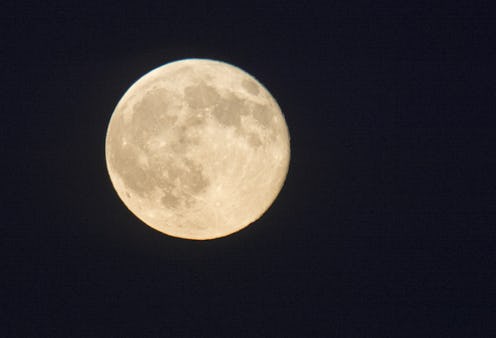News
How To Watch The Blue Moon
Are you planning on checking out the Blue Moon tonight? It's the first and only one of the 2016 calendar year, and it's of the seasonal variety ― whenever there are four full moons in a season instead of the usual three, the third of them is considered a Blue Moon. And if you're an enterprising stargazer of any sort, you'll probably want to take at least a couple minutes to catch a glimpse. So in that spirit, here's some information on how to watch the Blue Moon, from different time zones and cities throughout the United States.
If there's one thing that could derail your moon-gazing plans right quick, of course, its foggy or cloudy weather, so your first step if you're hoping to see it should be to check the weather in your area. In the event that it isn't going to cooperate, there's still an option open to you, however ― you can check it out on an online stream. The folks over at Slooh Observatory are streaming some views of the moon, which you can take a look at here.
But if you do indeed have clear skies overhead, here are some local times when the Blue Moon should be visible. Make sure you don't miss your chance!
- If you're living in the eastern time zone (ET) ― say, in New York City, New York ― the Blue Moon should rise at 7:58 p.m. on Saturday evening, and set at 6:21 a.m. on Sunday morning. Depending on your specific city, however, the times will vary somewhat: In Boston, it'll rise at 7:51 p.m. Saturday and set at 6:05 a.m. Sunday, while in Atlanta (also in the eastern time zone but far to the south) it'll rise at 8:29 p.m. Saturday and set at 7:18 a.m. Sunday.
- If you're living in the central time zone (CT) ― take New Orleans, Louisiana for example ― the Blue Moon should rise at about 7:46 p.m. Saturday evening and set at about 6:48 a.m. Sunday morning. Again, however, depending on where you're located within the time zone this will vary: in Dallas, Texas it rises at 8:19 p.m. Saturday, and sets at 7:11 a.m. Sunday, while in Indianapolis it rises at 8:38 p.m. Saturday and sets at 7:13 a.m. Sunday.
- If you're living in the mountain time zone (MT) ― in Denver, Colorado for example ― the Blue Moon should rise at about 8:06 p.m. Saturday evening and set at 6:31 a.m. Sunday morning. Other cities up and down the time zone will have slightly different times, of course: in Phoenix, Arizona it'll rise at 7:23 p.m. Saturday and set at 6:13 a.m. Sunday, while in Las Vegas, Nevada it'll rise at 7:41 p.m. Saturday and set at 6:20 a.m. Sunday.
- If you're living in the pacific time zone (PT) ― in the city of Los Angeles, California perhaps? ― the Blue Moon should rise at about 7:50 p.m. Saturday evening and set at 6:37 a.m. Sunday morning. Other cities along the western seaboard will have slightly different times, so be aware: in Portland, Oregon it will rise at 8:33 p.m. Saturday and set at 6:30 a.m. Sunday, while in Seattle, Washington it'll rise at 8:37 p.m. Saturday and set at 6:22 a.m. Sunday.
- If you're one of those select Americans who live off of the United States mainland, either in Alaska (which is under the Alaska time zone) or in Hawaii (which is under the Hawaii-Aleutian time zone), then your moonrise and moonset times will be considerably different. In Anchorage, Alaska for example, it'll rise at 10:29 p.m. Saturday evening and set at 6:17 a.m. Sunday morning, while in Honolulu, Hawaii it'll rise at 7:14 p.m. Saturday and set at 6:41 a.m. Sunday.
And remember, if you miss out on catching this seasonal Blue Moon, you're going to have to wait a good long while for another chance ― the next one isn't until January 2018. So do yourself a favor and tilt your head up if you're out and about tonight!
